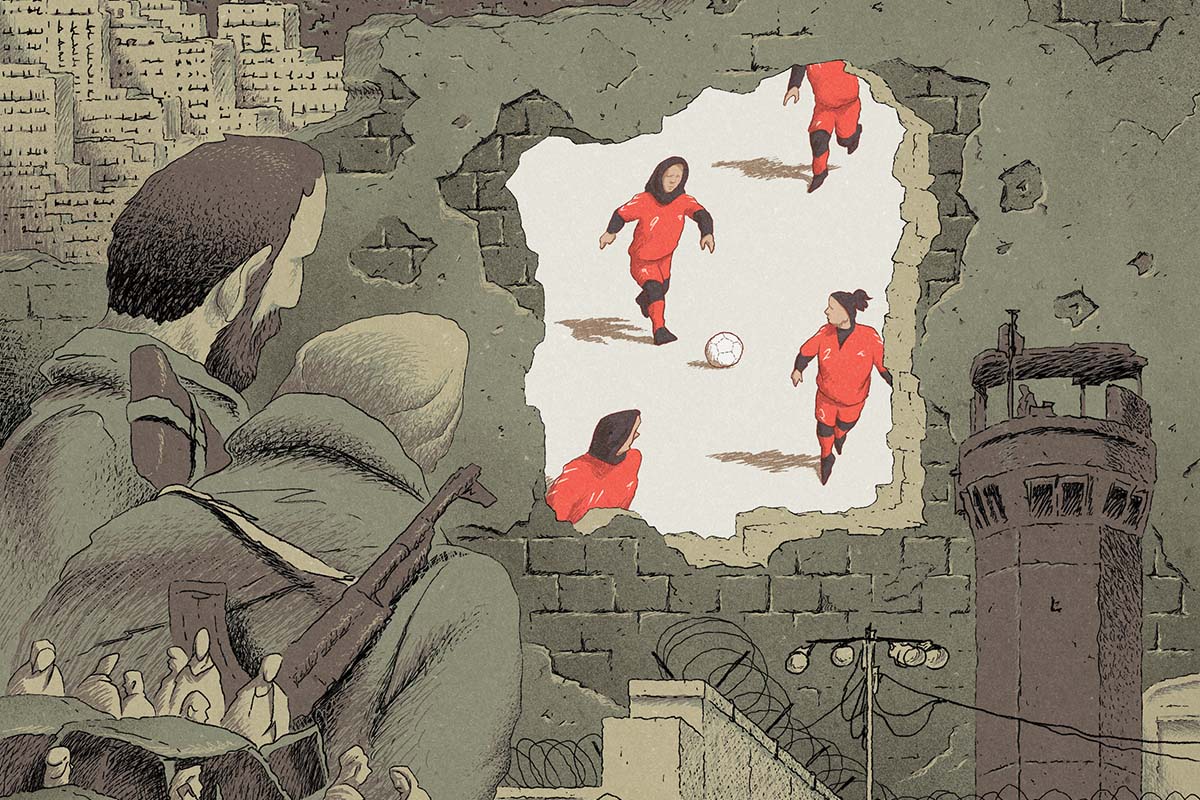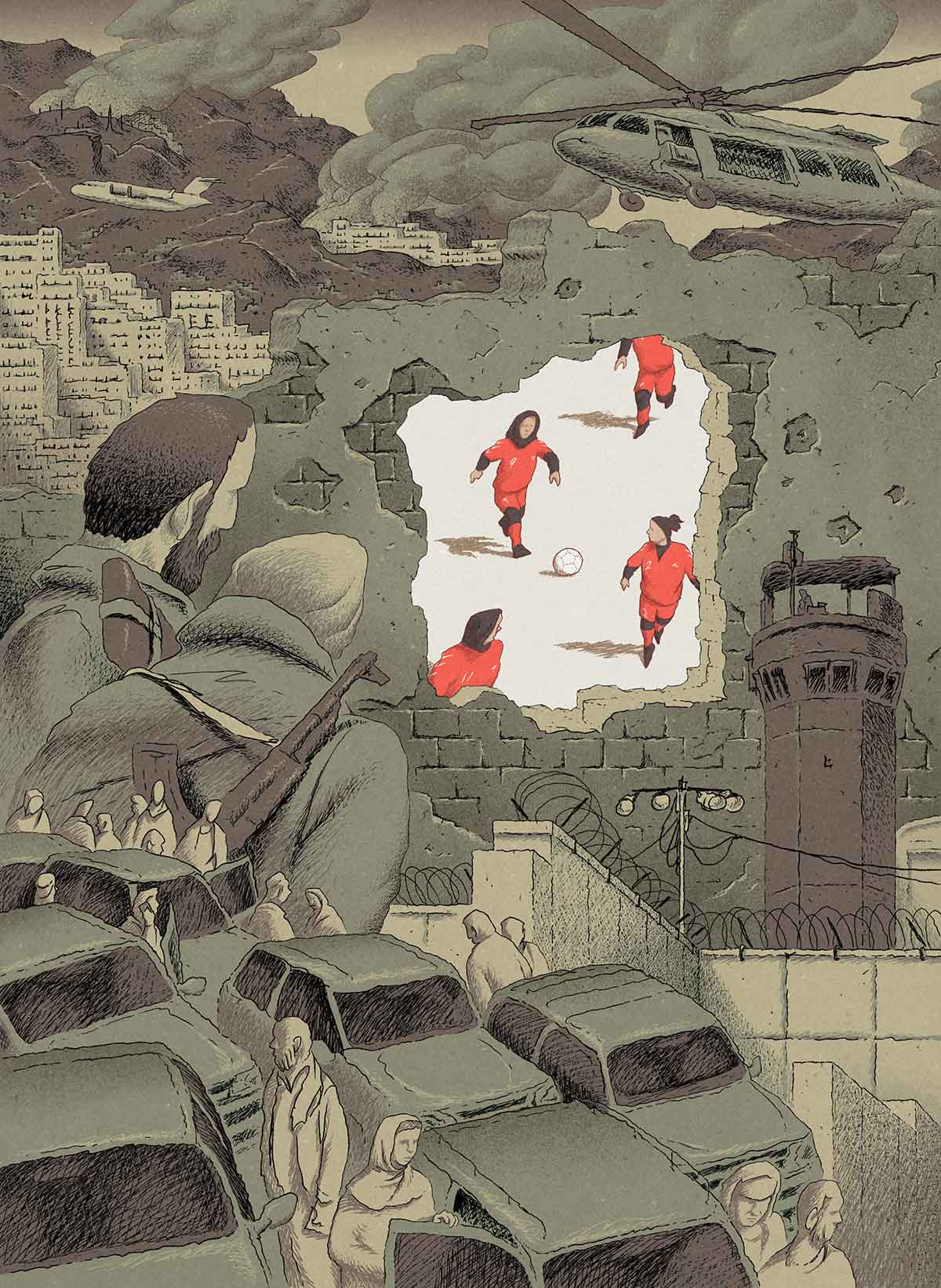
WORLD / DECEMBER 2024
Did Canada Betray Afghanistan’s Female Soccer Players?
When the Taliban retook the country in 2021, Canada promised its national team visas—tickets to safety. Years later, players are still waiting
BY ANNIE HYLTON
ILLUSTRATION BY CHRIS W. KIM
Published 6:30, OCTOBER 8, 2024

In late August 2021, Noor and her family piled into a car to flee Afghanistan. In the weeks prior, they’d watched in horror as Taliban fighters swept across the country, overtaking provincial capitals and then Kabul itself. The fundamentalist group that once ruled the country occupied police stations, established checkpoints, and decorated vehicles with Taliban flags. Life as Noor and her family had known it for twenty years had dissolved.
Noor, who was in her mid-teens at the time and whose name has been changed for her protection, feared for her life: she was a player on Afghanistan’s national women’s soccer team—among the sports the Taliban once vehemently outlawed for women. As the Taliban took over the country that summer, various organizations and rights groups began working around the clock to get the players out, but many of them were stuck, waiting for evacuation flights or to obtain official documentation.
For weeks, the capital was in chaos. Helicopters and military jets buzzed overhead. Streets were jammed with vehicles bearing mattresses and household appliances. Prisoners who’d broken free of a pair of abandoned detention facilities roamed the streets. Then president Ashraf Ghani and his entourage fled the country. Desperate crowds stormed the Hamid Karzai International Airport terminal and tarmac. Some climbed the wings of an American military cargo plane and fell from the sky as it took off; others were crushed under its wheels. Many thought that, with some kind of identity document or paperwork, they could make it out to Europe or North America.
Tensions reached a height on August 26, the day the Canadian airbridge was closing, when a man named Abdul Rahman al-Logari, whom the Taliban had helped break free from prison a few days earlier, worked his way through the mass of people surrounding the airport’s Abbey Gate entrance. That evening, he detonated a suicide vest, killing 170 Afghan civilians and thirteen United States service members and injuring hundreds.
As the final US withdrawal date of August 31 loomed, Noor waited trepidatiously for more information. The Afghanistan Football Federation, the national governing body for the sport, was attempting to facilitate players’ exit from the country with the help of FIFA, the international football federation, of which AFF is a member.
On August 29, Noor received a WhatsApp message, via her father’s phone, from Fazil Mohammad Shahab, general secretary and CEO of AFF, who had forwarded a voice note from FIFA president Gianni Infantino. Canadian visa letters had been issued, Infantino said, and the athletes and their families should get ready to leave Afghanistan. Shortly thereafter, Shahab forwarded four documents via WhatsApp, one for Noor and three for her family members. The letters stated that the holder had been granted a Canadian visa. “When I heard about the visa,” Noor recalls over the phone, “I became so happy and hopeful. I felt that, again, I will be able to continue my education and football.”
A few days later, along with tens of thousands of people who clogged the capital’s streets en route to the airport, Noor and her family, with visa letters in hand, tried their luck. As they drove through the congestion, inching forward, another attack forced them to turn back.
The Canadian letters that she and hundreds of others had received were seen as tickets into Kabul’s airport, onto an evacuation flight, and onward to safety in Canada. They stated exactly that. But as the chaos of the withdrawal continued, unbeknownst to players and their families, the letters were rendered worthless. Some who held the documents were turned away at the airport or were forced to go underground. Three years later, many of them remain in hiding.
Now, six people who received those letters, including Noor and other former players and supporters, are suing the Canadian government. They are asking Canada to fulfill its promise of visas, but the government claims it never promised visas to begin with.
When Noor was a young girl, she would watch, captivated, from the sidelines as her male classmates played soccer. Her school’s practice grounds were makeshift, and the country was still adjusting to the idea of women participating in public life. The Taliban regime that had ruled large swaths of the country since the mid-1990s had banned women from practising sports, and so stadiums carried ghosts of the past, with public executions having stained the soil.
Within a month of the September 11, 2001, attacks, the US launched a bombing campaign in Afghanistan, known as Operation Enduring Freedom, to oust Taliban and al-Qaeda operatives; Canada pledged support. By December, the allied forces toppled the Taliban, and an interim government was established. In the fall, then US president George W. Bush had announced a “global war on terror,” iterations of which lasted two decades—with Canada’s active participation—and its consequences cast a long shadow. “Enemy combatants” with suspected links to al-Qaeda were held at black sites of the Central Intelligence Agency and the infamous detention facility at Guantánamo Bay, Cuba. Canada acted as a transit point for the CIA’s extraordinary rendition program, which saw people, including Canadian citizens, being subjected to “enhanced interrogation” techniques, including being waterboarded, sexually assaulted, and suspended naked from the ceiling. Over 40,000 Canadian Armed Forces members served in the North Atlantic Treaty Organization mission between 2001 and 2014, Canada’s largest deployment since World War II.
Along with its military involvement, Canada contributed to rebuilding and developing Afghanistan. Between 2001 and 2021, it provided approximately $3.7 billion in assistance. Canada’s foreign policy, according to the government’s website, is guided by a feminist lens and “the rights of women and girls.” Shortly before the US withdrawal and the fall of Kabul, Global Affairs Canada (GAC) produced an evaluation report examining the impact of Canada’s development initiatives in the country between 2015 and 2020. It praised gender-equality efforts as having earned Canada “a reputation as a leader” in the “women’s and girls’ rights and empowerment sector [that] resulted in female beneficiaries becoming more active, confident and self-sufficient,” according to the CBC.
Still, conservative customs were entrenched, and in the early days, change for women and girls in Afghanistan was sluggish. Women risked ostracism from family and even death threats for playing sports. Some dressed as boys, and others met secretly, hidden by walls and playing in silence. Noor was determined: as soon as she returned home from school, she would switch on the television to watch girls competing in soccer tournaments and imagined being amongst them on the field. She soon spoke with her teachers and requested to join a nascent team for female students that the school was forming. When they agreed, Noor’s father took her to buy soccer cleats and a uniform from the local market.
For nearly three years, Noor participated in every practice and match and envisioned herself becoming a successful soccer player—to secure her future and provide for her family. In the mid-2000s, other girls’ teams were forming across the city, and an unofficial, ad hoc sports league was created. In 2007, Afghanistan’s Olympic committee formed the country’s first national women’s soccer team; its members began travelling internationally, facing teams and players with years more experience, in Pakistan, Sri Lanka, and Bangladesh, and attending training camps in countries including Jordan and Germany. Some of the girls on the team had come of age under the Taliban, and their mere existence in the sporting world was an act of defiance against the old regime.
After a few years, AFF invited Noor’s team to compete in a local tournament to recruit players for the national team. Noor was selected. “That was the moment I felt I got closer to my dreams,” she recalls. The team played in full-length pants and baggy, long-sleeved shirts, in scorching weather, and many wore head scarves. Spectators threw stones or accused them of being prostitutes; male strangers sent threatening texts and made menacing calls. Some players were beaten; one player’s son was kidnapped by armed men. The team practised at a stadium in Kabul, and when that was forbidden, NATO offered them a small patch of grass inside its main base, where they were protected from prying eyes. The pitch doubled as an active helicopter landing pad, where Black Hawks would interrupt their drills. Some players travelled hours by foot and taxi, risking harassment and assault along the way, to reach the site.
In 2018, the team flew to Jordan for a training camp. Khalida Popal, the team’s founder and former captain who had been forced to flee Afghanistan in 2011 and seek asylum in Denmark, helped organize the event. She noticed two men with AFF, who had travelled with the players, bullying and harassing team members. The abuse, she learned, was being perpetrated and covered up by the AFF president himself, Keramuddin Karim, a former governor of Panjshir province. Popal discovered cases of rape, physical abuse, and death threats. “He has a room inside his office that is a bedroom with a bed. The doors of his office [use] fingerprint recognition, so when players go in, they can’t get out without the fingerprint of the president,” Popal told the Guardian. One player said that Karim assaulted her physically and sexually, put a gun to her head, and threatened to shoot her and her family if she went public.
After trying multiple avenues for reporting the allegations, players went to FIFA, whose ethics committee found Karim guilty and imposed a life ban and a fine of roughly $1 million (US). “Mr Karim systematically harassed and sexually abused a number of (at least five) players, with behaviour ranging from inappropriate touching and offensive comments to assault and rape. The situation lasted for years,” the panel found. Afghanistan’s then president, Ashraf Ghani, called the allegations “shocking for all the people of Afghanistan” and urged the attorney general to investigate. Charges were filed and an arrest warrant issued. Karim evaded arrest and is still on the loose.
In 2019, the national women’s team won their first match, and the players started getting praise across social media and invitations to appear on television shows and in newspaper articles. To the outside world, the team was thriving.
By contrast, Afghanistan itself was fissuring, revealing cracks in the nearly two-decade fight for democracy and gender equality. In 2019, the US and Taliban reached an agreement in principle on the framework of a peace deal, which served as the preliminary terms for the US withdrawal from the country, later signed under the Agreement for Bringing Peace to Afghanistan (often known as the Doha Accord). But after US president Joe Biden announced the withdrawal in April 2021, the Taliban charged their way across the country, capturing province after province through the summer. AFF staff continued working from the organization’s offices in central Kabul, convinced the Taliban would not reach the capital.
By mid-August 2021, however, the Taliban had stormed the city and precipitated the collapse of Afghanistan’s government. Canada announced special immigration programs for Afghan refugees, including those who had worked with Canadian forces as interpreters, cooks, drivers, security guards, or local staff at Canada’s embassy in Kabul. Another program provided a pathway for family reunification, while yet another made women leaders, human rights defenders, and other vulnerable individuals eligible to resettle in Canada through referrals or private sponsorship.
But the national women’s soccer team was especially at risk. Karim had re-emerged publicly and aligned himself with the Taliban, now in charge, and was allegedly being protected by local warlords. Noor and her teammates were told to burn their jerseys and delete social media activity—the Taliban, they learned, would be attempting to hunt them down. According to a New York Times article, one of Noor’s teammates obtained a gun and told Popal, who was then outside of Afghanistan, over a video call that she would use it to shoot herself if the Taliban came for her. Another player took a shovel and buried the evidence of her participation in the team in her backyard—marking the death of freedom for women in Afghanistan.
In early August, seven years after withdrawing troops from Afghanistan, the Canadian Armed Forces returned to Kabul to assist in evacuating vulnerable Afghans with ties to Canada. In a matter of weeks, they evacuated some 3,700 people. But thousands more were left behind. On August 5, Canadian senator Marilou McPhedran was invited by then Canadian minister for women and gender equality, Maryam Monsef, to discuss the situation, specifically the risks to women and girls. On August 13, the Canadian government announced that it would resettle 20,000 Afghans, with a special program focused on particularly vulnerable groups. (The federal government would later promise to resettle 40,000 Afghans in Canada, fulfilling that goal by 2023.) At the same time, FIFA began looking for support from countries in evacuating Afghan women with connections to athletics. The closing of the airbridge was looming.
Soon after the fall of Kabul on August 15, McPhedran, who has a background in human rights law and has advanced women’s rights in Afghanistan for some twenty-five years, began receiving requests to assist female soccer players evacuate from Afghanistan. She tapped Laura Robinson, a sports journalist, to “take the lead,” McPhedran noted in an affidavit, and began compiling a list of people who were deemed high risk. McPhedran drafted a letter, written on Senate letterhead and bearing her personal cellphone number, that requested that the holder be granted entry to the Hamid Karzai International Airport, noting that the holder had made a formal application to Canada and that she would assist with resettlement. This letter was distributed to several players on the Afghan women’s soccer team.
But when players and their family members arrived at the airport, Canadian soldiers turned some back because, McPhedran noted in an email to numerous government officials, “they did not have sufficient evidence of official acceptance.” Those individuals, it turned out, had not formally applied for resettlement through the immigration system and were not officially recognized or pre-approved for a visa—which they were never told to do. Some hid in a nearby petrol station or knee deep in sewage in a trench as the Taliban roamed the streets; others were beaten by the Taliban and subsequently hospitalized. On August 25, in an email exchange that included McPhedran, Robinson, Monsef, and George Young, then chief of staff to minister of defence Harjit Sajjan, McPhedran asked: “Canadian forces on the ground still not helping those who show them a letter—why?” Young responded: “I do not know if a letter from a Canadian Senator has any sort of direct impact on what is a multi-national effort,” noting that GAC and Immigration, Refugees, and Citizenship Canada are typically the ones to issue documentation for Canada.
Young then followed up: “I have received this from a colleague at GAC . . . try it.” Robinson, on behalf of McPhedran, and FIFA officials then shared this letter—titled “Facilitation Letter Visa.pdf”—with over 650 women athletes and their supporters, including Noor and her family, via WhatsApp. Each document contained the recipient’s name in English, a GAC stamp, and the official logo of the Government of Canada, and it stated in English and Pashto: “The Canadian Government validates that the names identified below have been granted a VISA to enter Canada. Please allow these persons safe travel to Hamid Karzai International Airport so that they can board their organized flight.”
Facilitation letters, it appeared, had reached the hands of those who needed them most.
Before the closing of the Canadian airbridge on August 26, some players had managed to navigate the tumult and use the letters to evacuate. But the vast majority, including Noor, could not.
Weeks passed as Noor waited for more information. Around mid-September, FIFA officials, McPhedran, and others shared a complete list of the letter recipients with IRCC to help expedite their exit should other evacuation opportunities arise. McPhedran understood that “the evacuation efforts for these vulnerable women and individuals associated with them would be the beginning, and not the end, of Canada’s commitment to bring them to safety,” she wrote in her affidavit.
Meanwhile, Shahab, the AFF official, was in “grave danger,” according to emails from FIFA officials to Robinson. He was “forced to meet with the Taliban each day” and provide “the names and details of all national and regional women’s team players . . . and the staff and officials that had developed and promoted women’s football in the country.” Many of the individuals he was forced to identify consequently went underground and were desperately writing to the groups for updates. “My life badly changed,” Noor told me. “I am in a place where I feel like a prisoner who cannot go anywhere and cannot do anything.”
Another player, whom I’ll call Aysha, was told by Shahab to obtain passports for herself and her family to expedite the paperwork for their evacuation to Canada. They would be departing in a matter of days, they were told, and their passports were about to expire. The family had no money, so they sold their belongings to pay a broker the equivalent of nearly $1,000 per passport. They sat in an empty home, waiting with their luggage for news.
In late September, as FIFA officials were continuing to organize evacuation flights, the association was surprised to learn that the Canadian facilitation letters that had been sent to the national women’s team were invalid. FIFA officials had relied on the letters to negotiate evacuations and resettlement.
McPhedran, learning of this development, wrote an email to IRCC staff, noting that FIFA officials had told her that “at no point until last night did IRCC tell FIFA ‘that the Canadian visa letters held by most of the identified evacuees were not being honoured by Canada now.’” McPhedran implored IRCC to reconsider, emphasizing the hypocrisy of the decision to exclude the types of people Canada had publicly claimed to be helping as part of its commitment to gender and human rights. “I’ve just come off a call with the FIFA Human Rights Division . . . the adjectives used to describe Canada include ‘disgusting’ and ‘dishonest,’” McPhedran wrote. She noted there was a very high probability of these female athletes being trafficked or coerced into marriage to Talib fighters.
Behind the scenes, IRCC staff were scrambling. Through September, they had been inundated with emails about efforts to evacuate people with ties to Canada—only then coming to appreciate the number of people who had been given letters by McPhedran and FIFA.
In a statement to The Walrus, IRCC said that, in late August, it became aware of “numerous inauthentic facilitation letters,” noting that “facilitation letters were only issued from official Government of Canada email addresses and were sent directly to clients. IRCC did not authorize any third party to issue facilitation letters on its behalf.”
But the damage had already been done. Every person who received one of these facilitation letters had assumed, and continued to assume, that the letters were more than that: they were their tickets out.
On September 21, a FIFA official emailed IRCC staff saying that the individualized letters had “been a lifeline of hope to cling to whilst in hiding in Kabul,” noting that the decision not to honour the letters put FIFA’s evacuation efforts in “grave jeopardy.” Finally, the FIFA official wrote that the chance to collaborate “provides us with a unique opportunity to lay bare our social values for the world to see in the lead up to the FIFA World Cup 2026.” (In 2018, FIFA had announced that Canada, the US, and Mexico would host the upcoming men’s and women’s World Cups.)
In mid-October, Andreas Graf, a FIFA official, messaged the WhatsApp group chat of the players still in Afghanistan, which included Noor and Aysha, writing that around 100 more people had just left Kabul on an evacuation flight. “We continue to work hard for the safe evacuation for all of you,” Graf’s message said; “please stay safe and strong.” Meanwhile, gruesome images of the severed head of Mahjabin Hakimi, a member of the national women’s volleyball team, spread across social media; the Taliban had allegedly beheaded her as they searched for female sports players still in the country. (In a statement to The Walrus, FIFA said it had evacuated more than 160 “at-risk players, officials, and human rights defenders connected to football and basketball in Afghanistan.”)
Finally, in mid-November, Noor received another message from a FIFA representative: “The government of Canada has advised us that the visa facilitation letters you received are no longer valid.” In January 2022, FIFA transmitted one of its final messages to the group WhatsApp: “Unfortunately, there are currently no governments that are willing to provide visa [sic] to members of the group who still remain in Afghanistan. As FIFA, we are dependent on governments in that respect. This is why no further evacuation flights have been possible,” it said. “Please stay safe and well and keep the hope alive.”
Aysha says she tried to press FIFA, AFF, and others for updates, but FIFA had left the WhatsApp group. “We were thinking of going to Pakistan . . . but [because of] the visa, we didn’t go,” Aysha says. “I wish we went.” The Taliban physically attacked her and her family members and ransacked her home. They were forced to travel to a nearby country, where, she says, they may soon find themselves on the streets due to their precarious living situation.
Shamila Kohestani, the team’s former captain, keeps in touch regularly with Aysha and players still in Afghanistan. She said she, too, had tried to find avenues to help but was blocked at every turn. “FIFA doesn’t want to deal with it anymore. They don’t care,” Kohestani says. “[Canada] and every country in good standing to accept immigrants is a member of FIFA. You think they have no power? They can’t say, ‘Hey, can you each accept ten, twenty families. . . . They just don’t care. [Afghan] lives are not as valuable.”
One of the players messaged Kohestani recently: “I risked my life to play soccer, I served the football federation for almost 15 years, and now I live in a cage. FIFA, and nobody, cares for me.” In a statement to The Walrus, FIFA noted that the association “worked on the safe evacuation of as many at-risk sports persons as possible. As was the case with the other organisations and institutions involved in the humanitarian efforts in Afghanistan, due to procedural complexities during evacuation and the context in Afghanistan, FIFA’s remit as a sports governing body meant that we were unfortunately not in a position to evacuate as many at risk-players as we would have wanted.”
In n the spring of 2022, Sujit Choudhry and Maureen Silcoff, two Canadian lawyers, learned about a group of Afghan athletes who had been issued letters they interpreted as visas for Canada but who remained in Afghanistan or in precarious situations in other countries. “‘Where’s my Canadian visa? We’ve been waiting for months and months and months for our Canadian visa—where is it?’” Choudhry recalls hearing. “As we followed that thread,” he says, looking into the genesis of the letter, “we discovered there were people still with the letters in Afghanistan,” in hiding. One of them had forgone an opportunity to leave Afghanistan for a European country, thinking they had a ticket to Canada.
When Choudhry and Silcoff got in touch with the players and their supporters in Afghanistan, it was clear that everyone believed they had been granted a visa by the Canadian government. That September, the lawyers, on behalf of six Afghan applicants who had received facilitation letters, including Noor and Aysha, issued a judicial notice in federal court to sue the Canadian government. In addition to being involved in high-level women’s sports, which the Taliban prohibit, the applicants also fear retribution for their role in Karim’s case. Karim has “targeted them in alliance with the Taliban,” Choudhry explains. They hope to compel Canada legally to honour the promise it made—or the applicants interpreted it to have been made—through the letters.
“We’ve identified these specific people at high risk—why not just give them permits, let them come to Canada, and make the whole thing go away?” Silcoff says. “The other piece is that the immigration minister has the legal authority to issue permits to people who come to his attention, who need a solution to their situation. So regardless of the letters, when cases of this nature are brought to the minister’s attention, there’s a way to bring people to Canada.” In a statement, IRCC said that “from time to time, the Department may facilitate the resettlement of specific groups or individuals facing extraordinary circumstances.”
Choudhry and Silcoff continue to communicate with their clients in Afghanistan, receiving messages that have become increasingly desperate. Many are hiding or are on the run, and some have faced attacks, interrogations, and threats from the Taliban and regularly change locations, cellphones, and SIM cards. One applicant said the Taliban are surveilling her car and travel patterns and have put a $20,000 (US) bounty on her head. Another received an anonymous text message: “You do not respond to messages. Wherever you are in Afghanistan, we can finally find you and kill you.”
Noor’s family, too, has faced “many attacks,” she says. “Now, not only I cannot play football, but I cannot get an education or go anywhere. . . . I am in jail with no hope.” She is currently living in an undisclosed location in Afghanistan.










